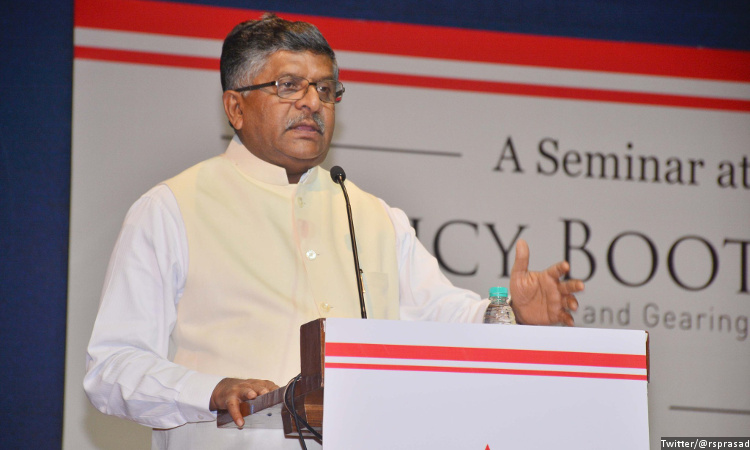Ravi Shankar Prasad Wrong. ‘Citizens Do Not Have Fundamental Rights To Privacy,’ Centre Previously Told SC

Reacting to the Supreme Court’s (SC) verdict, which declared the right to privacy a fundamental right, Ravi Shankar Prasad, minister for law and justice and information technology, tweeted on August 24, 2017: “Govt was of the view that #RightToPrivacy should be a fundamental right.”
Govt was of the view that #RightToPrivacy should be a fundamental right.
— Ravi Shankar Prasad (@rsprasad) August 24, 2017
"The government welcomes this judgement. The government has been consistently of the view particularly with regards to Aadhaar. The Right to Privacy should be a fundamental right and it should be subject to the reasonable restrictions," Prasad said, while addressing the media.
The claim made by Prasad does not hold true. The government, in 2015, had told the SC that “privacy was not a fundamental right under the Constitution and could not be invoked to scrap the Aadhaar scheme that has run into controversy over its collection of biometrics and personal data,” as the Hindustan Times reported on July 23, 2015.
Citizens do not have a fundamental right to privacy: Centre tells Supreme Court http://t.co/kJPPU7D3Wg pic.twitter.com/xExz3yiH5e
— Hindustan Times (@htTweets) July 23, 2015
“Constitution makers did not intend to make right to privacy a fundamental right,” Mukul Rohatgi, former Attorney General, had told the SC bench, during the hearing of petitions against Aadhaar in 2015.
Citizens don't have absolute right over their bodies: Government to SC https://t.co/0YShq3VfzG pic.twitter.com/X7o0DSZ0yF
— Times of India (@timesofindia) May 3, 2017
“The concept of absolute right over one's body was a myth and there were various laws which put restrictions on such a right,” Rohatgi told the apex court, according to this Times of India report dated May 3, 2017.
This was stated in response to petitions challenging the constitutional validity of Section 139AA of the Income Tax Act which made Aadhaar mandatory for filing income tax returns and applying for a PAN number from July 1, 2017.
Attorney general K K Venugopal on July 26, 2017, also argued on behalf of the government (the respondents in this case) against determining the right to privacy as a fundamental right protected under the Indian Constitution.
Privacy claims are a priority of developed countries “not in a country like India where a vast majority of citizens don’t have access to basic needs”, Venugopal had said, as India Today reported on July 27, 2017.
“The right to privacy is protected as an intrinsic part of the right to life and personal liberty under Article 21 and as a part of the freedoms guaranteed by Part III of the Constitution,” ruled the Supreme Court, presided by a nine-judge Constitution bench, on August 24, 2017. The bench comprised of chief justice Jagdish Singh Khehar and Justices R K Agrawal, S Abdul Nazeer, D Y Chandrachud, J Chelameswar, S A Bobde, Abhay Manohar Sapre, Rohinton Fali Nariman and Sanjay Kishan Kaul.
The decision on Aadhaar in context to rights to privacy is yet to be decided by a smaller bench of the apex court.
Soon after Prasad tweeted his statement, many on twitter took to reminding the law minister of these arguments.
For the Record: This was the govts view in July.
— Harinder Baweja (@shammybaweja) August 24, 2017
Citizens do not have fundamental right to privacy: Centre tells SC https://t.co/c10hnGLWod
+ "Citizens do not have fundamental right to privacy." The Centre tells SC - in 2015. https://t.co/nTfJCRC0he
— Nilanjana Roy (@nilanjanaroy) August 24, 2017
That is a blatant lie, sir. pic.twitter.com/2WqLpEjmvw
— Aleesha Matharu (@almatharu) August 24, 2017


